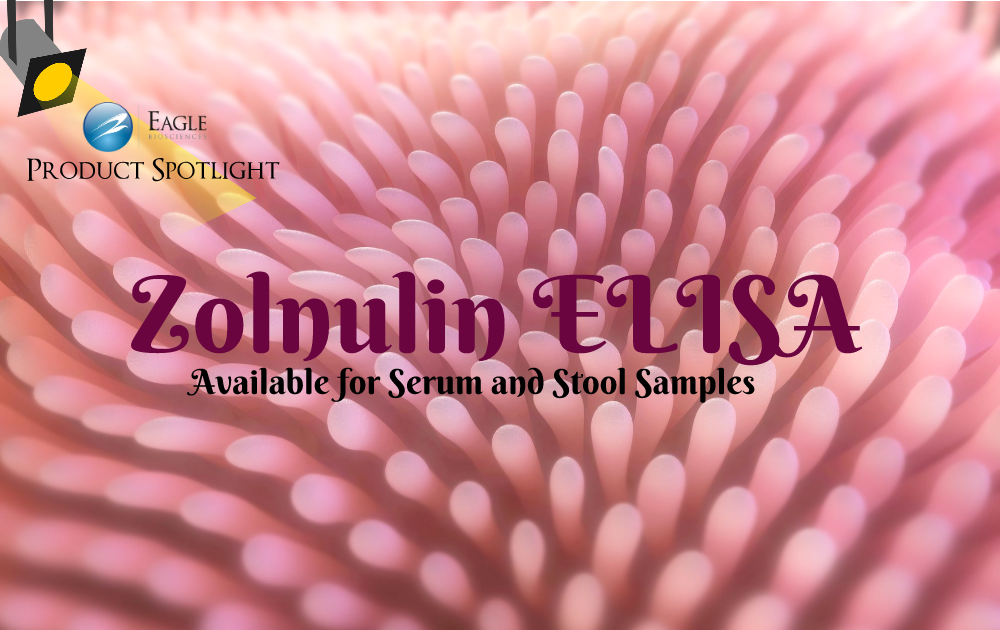Eagle Biosciences, Inc. has teamed up once again with Immundiagnostik to bring it’s customers a series of zonulin ELISA’s. These ELISA’s are used for the quantitative determination of zonulin in serum or stool samples.
Zonulin is a novel human protein analogue to the zonula occludens toxin derived from Vibrio cholerae which participates in tight junctions between cells of the wall of the digestive tract. Zonulin binds to a specific receptor on the surface of intestinal epithelia and triggers a cascade of biochemical events which induces tight junction disassembly and a subsequent permeability increase of the intestinal epithelia, allowing some substances to pass through and activate immune reactions.
Dr. Fasano and his co-workers found out that the zonulin-zonulin-receptor-system is
more activated in celiac disease and type 1 diabetes mellitus patients. Patients with
active celiac disease showed higher levels of zonulin and anti-zonulin antibodies
compared to non-celiac patients and patients in remission, who were on a glutenfree
diet.
Concerning the autoimmune type 1 diabetes, in experiments with rats it could be
demonstrated that elevated zonulin levels as well as increased intestinal permeability
precede a type 1 diabetes disease. Conversely, type 1 diabetes could be prevented
by inhibition of zonulin in animal experiments.
In addition, it was reported that many people who suffer from celiac disease also suffer
from other autoimmune disorders. It is suggested that increased levels of zonulin
are a contributing factor to the development of celiac disease and other autoimmune
disorders such as insulin dependent diabetes, multiple sclerosis and rheumatoid
arthritis.
Serum and Stool Zonulin ELISA’s are available now!
References:
1. Fasano, A, T Not, W Wang, S Uzzau, I Berti, A Tommasini, and S E Goldblum. 2000.
“Zonulin, a Newly Discovered Modulator of Intestinal Permeability, and Its Expression
in Coeliac Disease.” Lancet 355 (9214) (April 29): 1518–9. doi:10.1016/S0140-
6736(00)02169-3.
2. Wang, W, S Uzzau, S E Goldblum, and A Fasano. 2000. “Human Zonulin, a Potential
Modulator of Intestinal Tight Junctions.” Journal of Cell Science 113 Pt 24 (December):
4435–40.
3. Fasano, A. 2001. “Intestinal Zonulin: Open Sesame!” Gut 49 (2) (August): 159–62.
4. Freemark, Michael, and Lynne L Levitsky. 2003. “Screening for Celiac Disease in
Children with Type 1 Diabetes: Two Views of the Controversy.” Diabetes Care 26 (6)
(June): 1932–9.
Manual IDK® Zonulin ELISA
24
5. Lazzarotto, Francesca, Daniela Basso, Mario Plebani, Alessandro Moscon, Renato
Zanchetta, and Corrado Betterle. 2003. “Celiac Disease and Type 1 Diabetes.” Diabetes
Care 26 (1) (January): 248–9.
6. Watts, Tammara, Irene Berti, Anna Sapone, Tania Gerarduzzi, Tarcisio Not, Ronald
Zielke, and Alessio Fasano. 2005. “Role of the Intestinal Tight Junction Modulator
Zonulin in the Pathogenesis of Type I Diabetes in BB Diabetic-Prone Rats.” Proceedings
of the National Academy of Sciences of the United States of America 102 (8)
(February 22): 2916–21. doi:10.1073/pnas.0500178102.
7. De Magistris, Maria Teresa. 2006. “Zonula Occludens Toxin as a New Promising
Adjuvant for Mucosal Vaccines.” Vaccine 24 Suppl 2 (April 12): S2–60–1.
8. Sapone, Anna, Laura de Magistris, Michelle Pietzak, Maria G Clemente, Amit Tripathi,
Francesco Cucca, Rosanna Lampis, et al. 2006. “Zonulin Upregulation Is Associated
with Increased Gut Permeability in Subjects with Type 1 Diabetes and Their
Relatives.” Diabetes 55 (5) (May 1): 1443–9. doi:55/5/1443 [pii].
9. Thomas, Karen E, Anna Sapone, Alessio Fasano, and Stefanie N Vogel. 2006. “Gliadin
Stimulation of Murine Macrophage Inflammatory Gene Expression and Intestinal
Permeability Are MyD88-Dependent: Role of the Innate Immune Response
in Celiac Disease.” Journal of Immunology (Baltimore, Md. : 1950) 176 (4) (February
15): 2512–21.


